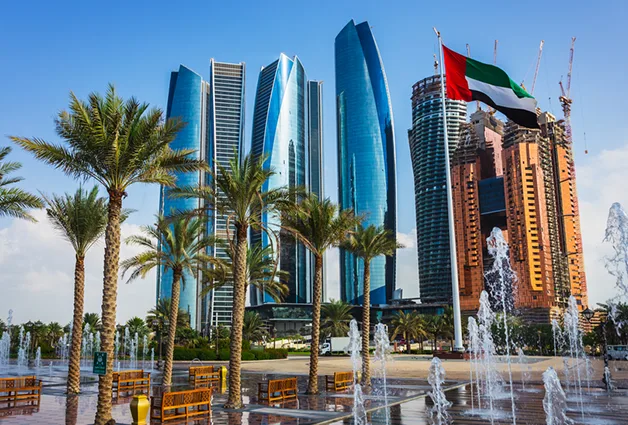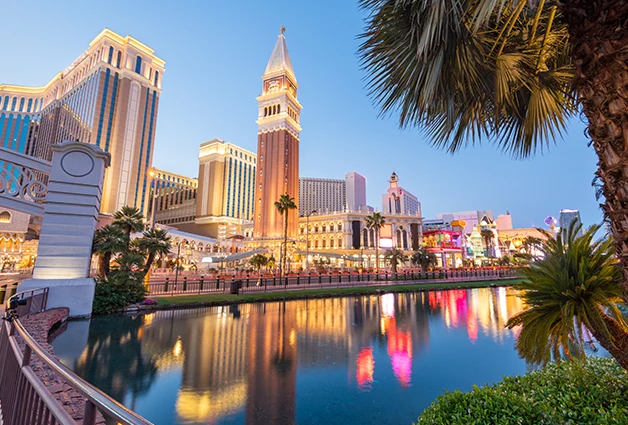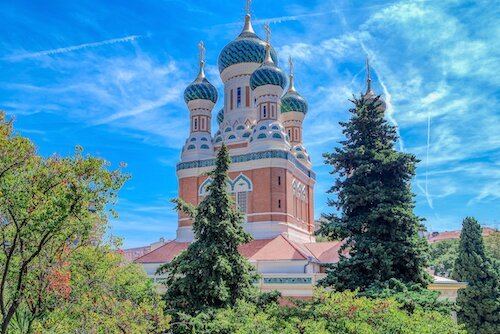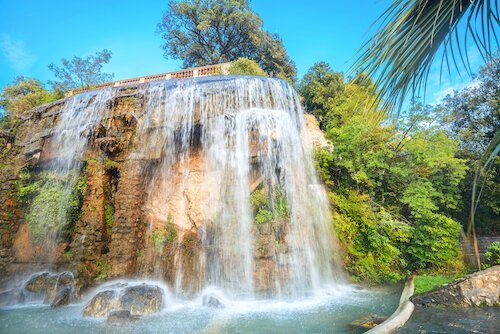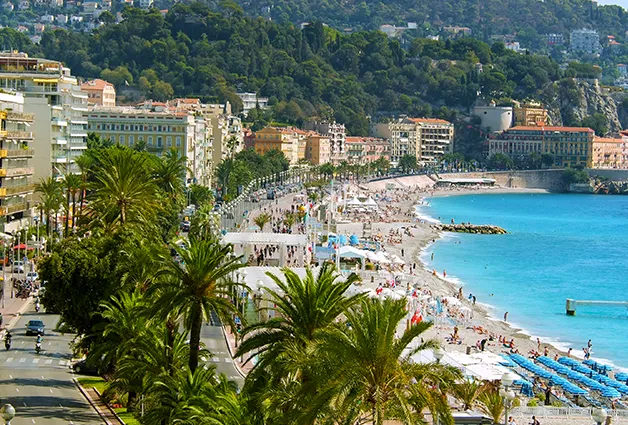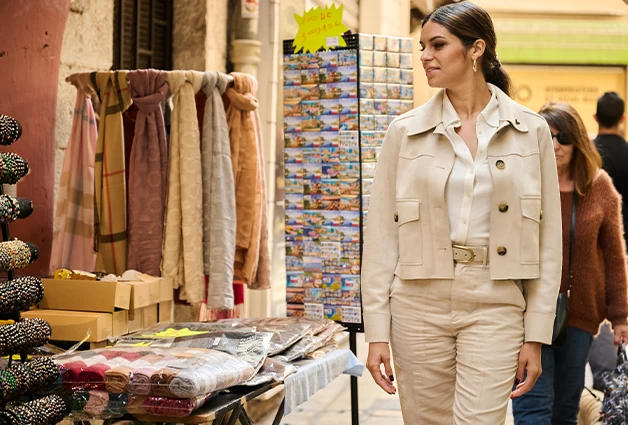Table of Contents
- Cuisine
- Things to Do
- 1. Promenade des Anglais
- 2. Parc de la Colline du Chateau
- 3. Vieille Ville
- 4. Place Masséna
- 5. Promenade du Paillon
- 6. Port Lympia
- 7. Monument aux morts de Rauba-Capeù
- 8. Musée Matisse
- 9. Musée Masséna
- 10. Other Art Museums
- 11. Le Negresco Hotel
- 12. Mont Boron
- 13. Libération
- 14. Marche aux Fleurs Cours Saleya
- 15. Château de Crémat
- 16. Saint-Jean-Cap-Ferrat
- 17. AGS Formule 1 at Circuit du Var
- 18. Day Trip to Èze
Promenade des Anglais
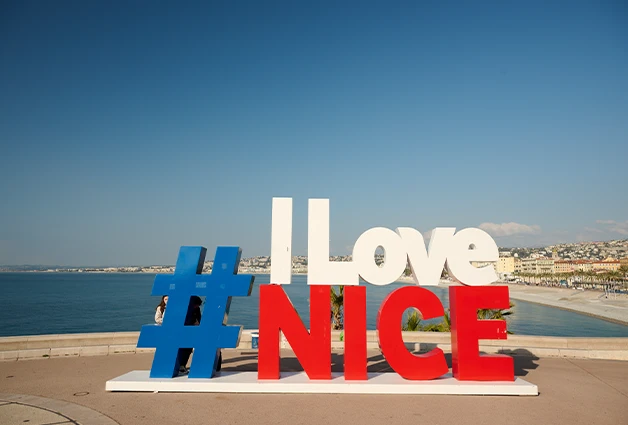
Promenade des Anglais is a beautiful stretch of road that runs along the beach with amazing views of the Mediterranean Sea.
The street is one of the most popular attractions in Nice as it is a wonderful place to enjoy the city’s great weather. It also has many storied landmarks and seemingly endless pebble beaches.
The diversion of traffic makes it easy to stroll along Promenade des Anglais and lap up the sunlight. This casual walk will likely top your list of unforgettable activities in Nice. Walking along the street is a popular activity, but if you want to appreciate its true beauty, you should visit Castle Hill Park.
Parc de la Colline du Chateau

Parc de la Colline du Chateau (Castle Hill Park) is a beautiful park on a hill close to La Baie des Anges (Bay of Angels). Its elevated position makes it a wonderful place to see the best views of Promenade des Anglais to the south and Port Lympia to the east.
The views make it popular among visitors, and you could argue that it is the best attraction in the city. The best place to observe the promenade is close to the dramatic waterfall on the south side of the park. Given the beauty of the surroundings, no one will blame you if you stare in awe for a long time.
Parc de la Colline du Chateau also has plenty of green spaces and a large lawn and play area for children. It's perfect for relaxation after a day of sightseeing.
Walking up the hill to the park is a great way to burn calories after eating rich French food. However, if you're in no mood for a hike, there's also an elevator available to take visitors to the park.
Vieille Ville

Vieille Ville is Nice’s old town (also known as Vieux Nice). It is a good example of the old-world architecture associated with Nice. In many ways, the Old Town is more Italian than French. The atmosphere is lively and full of shops, cafes, and restaurants with delicious food.
Perhaps the most famous building here is Cathedrale Sainte-Réparate (Nice Cathedral). The Baroque architecture cathedral is a popular place among tourists exploring Vieille Ville.
It's located west of the Place Rossetti square which has many restaurants and gift stores surrounding it. The square also hosts La Fontaine historique d'Obélisque, a drinking water fountain directly opposite the cathedral. It's an excellent place to take a break while exploring the town.
Other popular buildings in the old town include Le Palais de la Préfecture and the museum, Musée du Palais Lascaris (Palais Lascaris). The 17th-century building housing the museum was the residence of the Counts of Castellar.
Place Masséna

Place Masséna is a square at the heart of Nice. It has a variety of restaurants, retail shops, and hotels nearby and you'll likely see a crowd of tourists here regardless of the time.
You'll also find Nice's most notable landmark, Fontaine du Soleil (a fountain with bronze sculptures and a statue of Apollo) here.
While at the square, you're never far from delightful shopping or authentic French cuisine, so take some time to explore the neighborhood.
The main entrance to the Old Town is behind the square. Other nearby attractions include Jardin Albert 1er (Albert I Garden) and Promenade du Paillon. Take some time to enjoy the soothing sound of trams as they pass through the square. You can also board one for a ride around town.
Promenade du Paillon
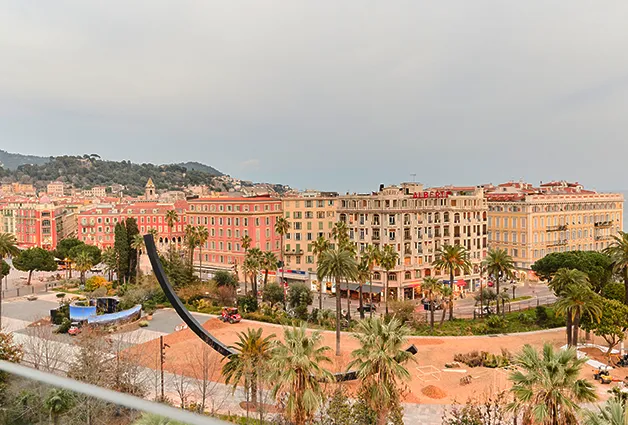
Promenade Du Paillon is a beautiful green space in the heart of Nice. It stretches from Musée d'Art Moderne et d'Art Contemporain down to Jardin Albert 1er. This urban park, which won the grand prize at the Victoires du Paysage in 2014, is a great place to visit.
You can make multiple stops at the park while exploring Nice. It is bordered to the east by Vieille Ville and the west by various retailers and hotels like Anantara Plaza Nice.
There's plenty of greenery in the park where you can have a picnic as you admire the beauty of the surrounding buildings. Its main attraction is Miroir d'Eau, a section of the park with water jets just west of Fontaine du Soleil.
Indulge in the tradition of getting close to the water show with other visitors. Don't be afraid to get wet.
Interestingly, Promenade du Paillon is built over the Paillon River. That's how it got its name. However, don't let walking over a river spook you. The Paillon River is dry most of the time and was the subject of jokes among the locals and visitors before the park was built.
If you're curious about the river, walking up north past Palais des Expositions will reveal it.
Port Lympia

Located east of Parc de la Colline du Château, Port Lympia is the main port in Nice. It is named after a spring that used to be on the site before the harbor's mid-1700s construction. Since then, it's been the place where boat journeys into the Mediterranean begin and where the city's yachts dock.
It's certainly not one of the largest ports on the French Riviera. However, you'll find yachts of various sizes and fishing boats ready to take on the Mediterranean Sea docked at the port.
You'll also find restaurants serving fine Mediterranean cuisine and buildings in pastel pink, mango yellow, and deep crimson red around the harbor. The scene could well be out of Italy or an impressionist painting.
While at Port Lymbia, you can't miss Monument aux Morts de Rauba-Capeù, a 32-meter-high war memorial across the street from the port.
Monument aux morts de Rauba-Capeù
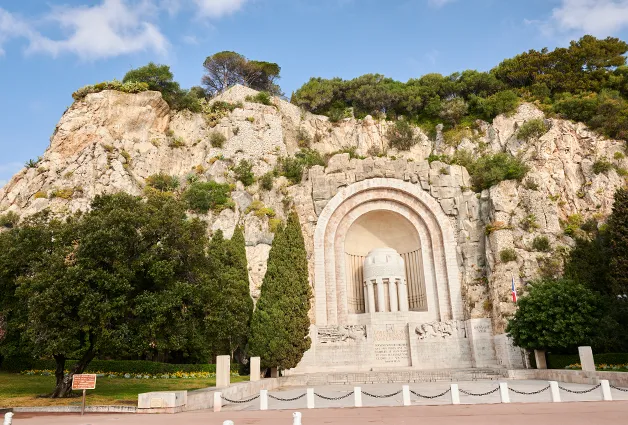
Monument aux morts de Rauba-Capeù (The Monument to the Dead of Rauba-Capeu) was built between 1924 and 1928 by Roger Séassal, an architect known for his work throughout Nice.
The imposing historic monument, built in honor of the individuals from Nice who lost their lives during the First World War, is one of the biggest empty tombs in France. The 32-meters high monument is situated at the bottom of Castle Hill, directly opposite Port Lympia.
Here, visitors can take in stunning views of the surrounding area and La Baie des Anges while sitting and honoring the memory of those the monument was built to remember.
After spending some time at the monument, you can walk up Castle Hill to Parc de la Colline du Chateau, where you can see a panoramic view of Nice.
Musée Matisse
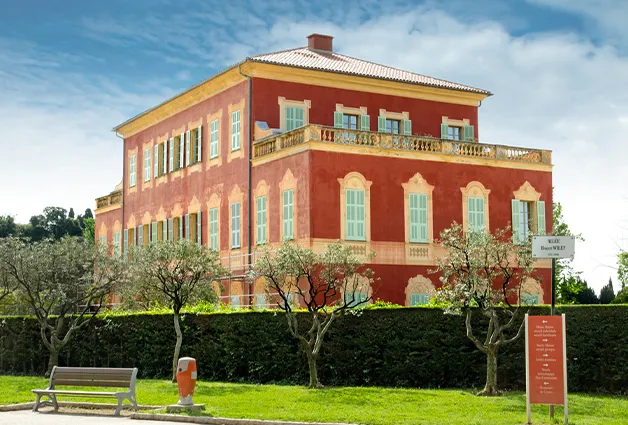
As the name suggests, the Musée Matisse (Matisse Museum) is a gallery featuring the work of French painter Henri Matisse. Housed in a stunning 17th Century Villa, the museum first opened its doors in 1963.
It is one of the world's largest displays of Matisse's work, featuring some of his best-known paintings, sculptures, and sketches. Henri Matisse, who lived in Nice between 1917 and 1954, donated many of the artwork within this museum to the gallery.
It also features numerous personal artifacts donated by his estate. This allows visitors to gain an even deeper understanding of the artist.
Musée Masséna
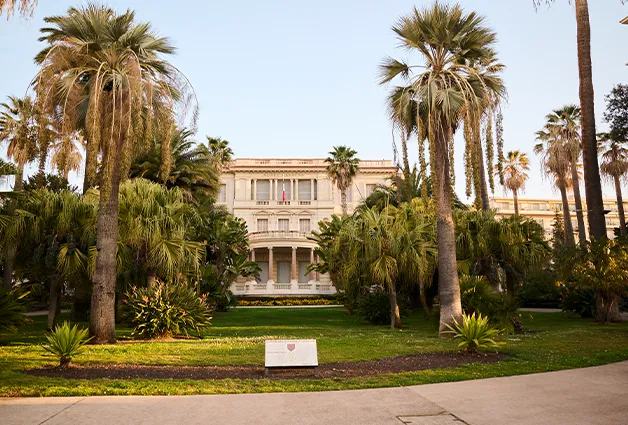
Visitors looking to learn more about Nice's rich history should step through the doors of the Musée Masséna, located on Promenade des Anglais, next door to Le Negresco Hotel.
Within the walls of this historic Villa, visitors can learn more about the history of the region and explore the exhibits dedicated to Napoleon Bonaparte.
One major selling point of the museum is the property's well maintained floor. It allows visitors to see how the Villa, designed by architect Hans Georg Tersling, looked in its glory years.
You can also explore the gardens, which were landscaped by the highly-regarded Edouard Andre. If you're interested in learning more about Napoleon and his family or the history of one of France's most stunning regions and cities, Musee Massena is the place to visit.
Other Art Museums

Pinning down just one must-visit art museum in Nice is difficult. The city is home to an eclectic range of art museums that should be explored by those who love art and history.
Musee des Beaux-Arts de Nice is filled with works dating from the 15th to the 20th centuries. It is home to works by Rodin and Pablo Picasso. Musee National Marc Chagall (Chagall Museum) is another art museum in Nice. It is devoted to the works of famed artist Marc Chagall.
Although there are works by other painters in the gallery, Musee Chagall’s real magic is in the paintings, sculptures, stained glass, and mosaics created by the museum’s namesake.
Travelers seeking modern art should visit the Musee d’Art Moderne et d’Art Contemporain. The contemporary art museum opened in 1990 in a sleek building that is as upbeat as the works it houses.
The gallery includes works from the New Realism, Pop Art, American Abstracts, and Minimalists genres dating from the 1960s and 1970s.
Le Negresco Hotel
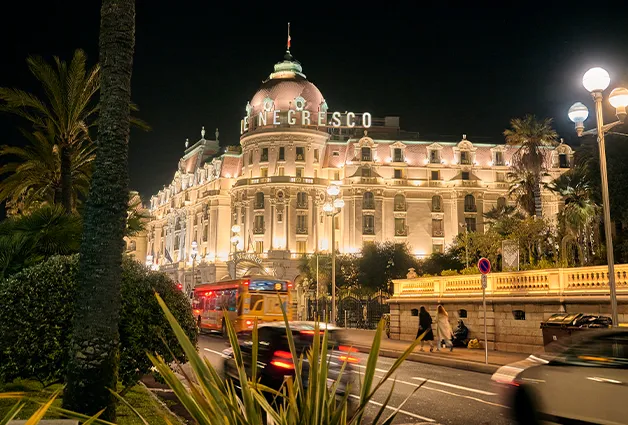
Often referred to as a 5-star hotel and museum in one, Le Negresco is an iconic landmark along Promenade des Anglais. The hard-to-miss Belle Époque style building is located right next to Villa Massena.
It's also one of the few hotels on Promanade des Angalis with private beaches. In addition to being a storied hotel with tastefully furnished rooms and themed suites, Le Negresco has an extensive collection of artwork in its hallways, suites, and the famous Royal Reception Room.
Each floor has different art themes, and if you're staying at the hotel, you're encouraged to wander around the floors to appreciate the art collection.
Guests at the hotel who like vintage items may enjoy taking a ride on the elevator. It has maintained its look since the hotel's opening in 1913. This includes the classic control on the inside, which has since been decommissioned in favor of something more modern.
If you decide to stay at another one of Nice's fabulous hotels, all is not lost. You can still appreciate the artwork by reserving a table at Le Chantecler, the hotel's Michelin-starred restaurant.
Remember to book well in advance as the restaurant is very popular, and even guests at the hotel may not get a spot easily at short notice.
Mont Boron

You can make the case that Nice's most beautiful attraction is the breathtaking views of the Mediterranean Sea it offers via Parc de la Colline du Chateau or Promenade des Anglais.
However, what you may not find in many travel guides is information on the fantastic views from Mont Boron. As the name suggests, Mont Boron is on a hill east of Port Lympia.
Once you make it to the top, you'll find Parc du Mont Boron. It is a large park with hiking trails to help you burn off the calories from the French cuisine you've been eating during your trip.
The park also has Fort du Mont Alban within it. It is a 16th-century fort that still has its structure mostly intact. While the fort's interior isn't open to the public, history buffs will enjoy observing the well-preserved exterior.
But the main attraction of Mont Boron is the gorgeous views of the Mediterranean Sea that are arguably better than what you'll see from Parc de la Colline du Chateau.
As if that wasn't enough, looking down the slope to the east will reveal some beautiful villas to make you appreciate the best part of living on the Mediterranean coast. The ideal place to enjoy these views is Point de vue sur Villefranche Saint Jean Cap Ferrat, close to the park's east entrance.
Unlike other parts of Nice, you won't find a crowd of tourists here, so you can enjoy the clear air and views in a serene environment. You could easily spend a full day here.
Libération
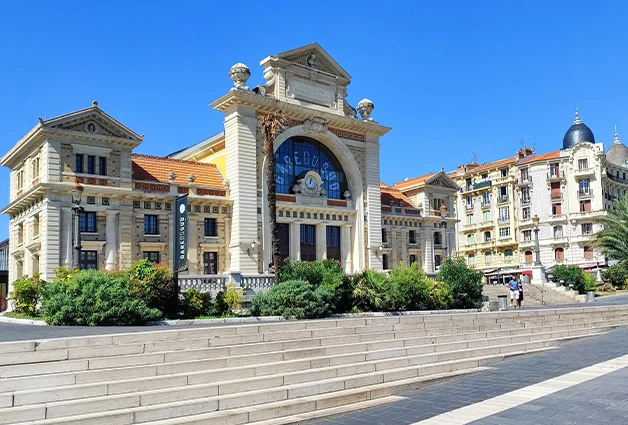
Libération is a vibrant district that offers visitors a taste of local life away from the tourist-heavy areas of the city. Known for its lively Marché de la Libération, one of the largest markets in Nice, the neighborhood is a favorite among locals and visitors.
The market is open daily and offers fresh produce, flowers, and regional specialties. Strolling through the market is delightful. The colorful stalls, aromas of fresh food, and lively vendors create an authentic experience.
The neighborhood is charming, with its tree-lined streets, Belle Époque buildings, and vibrant café culture. In addition to its famous market, the neighborhood is a great place for shopping and dining.
Libération has seen some changes in recent years. It now has trendy boutiques, artisan shops, and popular restaurants popping up alongside traditional bakeries and cafés.
The Gare du Sud, a historic train station converted into a modern food hall, is a must-visit spot in the neighborhood. It offers a variety of food stalls and cultural spaces.
Marche aux Fleurs Cours Saleya

Located on the southern border of Vieille Ville, Marche aux Fleurs Cours Saleya is an outdoor fruit and flower market that you will surely enjoy.
Open every day except Monday, the vendors sell a range of colorful fresh flowers, herbs, fruits and vegetables. The market also has a section for antics.
The aroma of the flowers and the fresh Mediterranean breeze offer a soothing atmosphere that’ll make you want to stay in the market all day, and there’s no reason why you shouldn’t.
If you’re into street food, plenty of options are available, including Pan Bagnat, Pissaladière, and the local favorite, Socca.
In the Summer Months (June-September), the market is open late into the night. This allows visitors to shop underneath the stars. Be sure to stop by an ATM before visiting the market, as most vendors will only accept cash.
Château de Crémat

Château de Crémat is on the windy road called Chemin de Crémat close the the north western border of Nice. Built in 1906 by wealthy olive merchant Antoine Mari, the winery is far from the crowds of tourists in the attractions closer to the bay.
Just a 17-minute drive from Promenade des Anglais, the chateau opens its doors to guests to experience its wine and vineyards.
Anyone can visit the tasting rooms to experience the delight of some of the best wines in the region, sourced from organic grapes from the vineyards around the chateau.
You can either come in for quick wine tasting, take a full tour of the vineyard and the delightful interior of the chateau, or spend up to 5 hours in a picnic in the gardens. The picnic option offers a curated picnic basket with pissaladière, crudites, cheese, and local favorite, pan bagnat.
Taking advantage of the picnic option is a good way to enjoy the peaceful environment while you have fine wine and tasty local dishes. Before you leave, you should stop by the shop on the premises to get a bottle or two of your favorite wine.
Saint-Jean-Cap-Ferrat
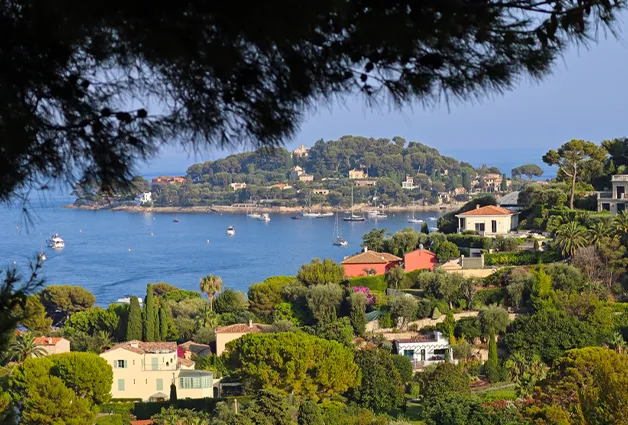
If the beautiful cliff-side villas in Mont Boron impress you, there are some nearby towns you should visit. Tourists seeking to explore other parts of the French Riviera should consider Villefranche-Sur-Mer and Saint-Jean-Cap-Ferrat.
Both are a few minutes east of Nice and perfect for day trips. Saint Jean Cap Ferrat peninsula shares the same appeal as Mont Boron but on a larger scale.
The peninsula is one of the most expensive residential locations in the world, and there are many expensive villas here.
However, unless you have a friend who owns one of these villas or you're thinking of buying one, you won't be able to get a close look at most of them.
But before you call your realtor, you should note that what's arguably the most impressive villa on the peninsula is open to the public. Villa Ephrussi de Rothschild, a Tuscan-style palazzo, was built by Béatrice Ephrussi de Rothschild, a member of the Rothschild banking family.
The villa's grounds are just as impressive as the building, with nine gardens, each with a different theme. Beyond the villa, other attractions include glorious beaches, Villa Les Cèdres (once the most expensive house on earth), and the Cap Ferrat semaphore built under the instruction of Emperor Napoleon III.
AGS Formule 1 at Circuit du Var
Just 90 minutes away from Nice, AGS Formule 1 at Circuit du Var is perfect for the racing fan during a trip to Nice. After enjoying the various attractions the city has to offer, travelers can visit AGS Formule 1 to explore the 1.4-mile-long auto racing track.
Visitors can take advantage of the driving courses and speed around the track in a Formula One car. The tight corners and fast straights will give drivers a real sense of what it’s like to be a Formula One driver.
You can choose from a number of Formula One cars to learn the ins and outs of driving an open wheel car from highly trained driving instructors.
Day Trip to Èze

Èze is a medieval village perched high above the French Riviera. It is one of the most charming spots in southern France. Just a 26-minute drive from Nice, it is perfect for a day trip. The village offers wonderful views of the Mediterranean Sea from its clifftop position.
Èze is known for its narrow streets lined with stone houses, art galleries, and shops. Visitors can explore its rich history and admire the well-preserved architecture while strolling through the streets.
One of the highlights of the village is the Exotic Garden (Jardin Exotique). It is at the highest point in the village and offers panoramic views of the coast and a beautiful collection of cacti.
In addition to its natural beauty and historical charm, Èze is also famous for its connection to the world of perfumery. The village is home to the Fragonard Perfume Factory, where visitors can learn about the art of perfume-making and even create their own fragrances. It's also worth noting that the village has two 5-star hotels, so feel free to stay for more than a day.
Nice is a beautiful city full of culture. Both French and Italian residents have influenced it over the centuries, and its past comes to life through the city streets. The South of France city is a must-visit for any traveler who wants to see some of the best views the Mediterranean has to offer. Beyond the views, the long list of things to do in Nice will keep you appreciating the beauty of the city long after your visit.
Weather

Local Favorite: Socca
Socca is a street food you will find around the gorgeous French Riveria city of Nice. The food item is a thin, crusty pancake made from chickpeas cooked in a woodfire pizza-style oven. While the hot side is crusty, the inside of a socca is soft. You will see kids tucking into Socca following a day at school. It is also a food item locals enjoy with a glass of wine or beer at a bar. Rumors suggest socca originated in 1543 when Turkish armies invaded Nice. As the story goes, the Nice fighters ran out of bullets so, they mixed chickpea soup and hot oil. They then poured the mixture down the walls of the city onto the heads of the Turks. Regardless of how effective that was, the Nice fighters tasted the oil and chickpea mix and immediately fell in love with it.


